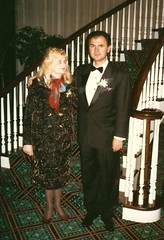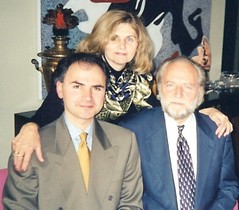Category Archives: French Poets
If You Only Knew – Robert Desnos (1900-1945)
Far from me and like the stars, the sea and all the trappings of poetic myth,
Far from me but here all the same without your knowing,
Far from me and even more silent because I imagine you endlessly.
Far from me, my lovely mirage and eternal dream, you cannot know.
If you only knew.
Far from me and even farther yet from being unaware of me and still unaware.
Far from me because you undoubtedly do not love me or, what amounts to the
same thing, that I doubt you do.
Far from me because you consciously ignore my passionate desires.
Far from me because you are cruel.
If you only knew.
Far from me, joyful as a flower dancing in the river at the tip of its aquatic stem,
sad as seven p.m. in a mushroom bed.
Far from me yet silent in my presence and still joyful like a stork-shaped hour
falling from on high.
Far from me at the moment when the stills are singing, at the moment when the
silent and loud sea curls up on its white pillows.
If you only knew.
Far from me, o my ever-present torment, far from me in the magnificent noise of
oyster shells crushed by a night owl passing a restaurant at first light.
If you only knew.
Far from me, willed, physical mirage.
Far from me there’s an island that turns aside when ships pass.
Far from me a calm herd of cattle takes the wrong path, pulls up stubbornly at the
edge of a steep cliff, far from me, cruel woman.
Far from me, a shooting star falls into the poet’s nightly bottle.
He corks it right away and from then on watches the star enclosed in the glass, the
constellations born on its walls, far from me, you are so far from me.
If you only knew.
Far from me a house has just been built.
A bricklayer in white coveralls at the top of the scaffolding sings a very sad little
song and, suddenly, in the tray full of mortar, the future of the house appears:
lovers’ kisses and double suicides nakedness in the bedrooms strange beautiful
women
and their midnight dreams, voluptuous secrets caught in the act by the parquet
floors.
Far from me, If you only knew.
If you only knew how I love you and, though you do not love me, how happy I
am, how strong and proud I am, with your image in my mind,
to leave the universe.
How happy I am to die for it.
If you only knew how the world has yielded to me.
And you, beautiful unyielding woman, how you too are my prisoner.
O you, far-from-me, who I yield to.
If you only knew.
Paris at Night – Jacques Prevert (1900-1977)
Three matches one by one struck in the night
The first to see your face in its entirety
The second to see your eyes
The last to see your mouth
And the darkness all around to remind me of all these
As I hold you in my arms.
Guillaume Apollinaire (1880–1918) – The Sign
I am bound to the King of the Sign of Autumn
Parting I love the fruits I detest the flowers
I regret every one of the kisses that I’ve given
Such a bitter walnut tells his grief to the showers
My Autumn eternal O my spiritual season
The hands of lost lovers juggle with your sun
A spouse follows me it’s my fatal shadow
The doves take flight this evening their last one
Translated by A. S. Kline
Guillaume Apollinaire (1880–1918) – Twilight
Brushed by the shadows of the dead
On the grass where day expires
Columbine strips bare admires
her body in the pond instead
A charlatan of twilight formed
Boasts of the tricks to be performed
The sky without a stain unmarred
Is studded with the milk-white stars
From the boards pale Harlequin
First salutes the spectators
Sorcerers from Bohemia
Fairies sundry enchanters
Having unhooked a star
He proffers it with outstretched hand
While with his feet a hanging man
Sounds the cymbals bar by bar
The blind man rocks a pretty child
The doe with all her fauns slips by
The dwarf observes with saddened pose
How Harlequin magically grows
Translated by A. S. Kline
Guillaume Apollinaire (1880–1918) – One Evening
An eagle descends from this sky white with archangels
And you sustain me
Let them tremble a long while all these lamps
Pray pray for me
The city’s metallic and it’s the only star
Drowned in your blue eyes
When the tramways run spurting pale fire
Over the twittering birds
And all that trembles in your eyes of my dreams
That a lonely man drinks
Under flames of gas red like a false dawn
O clothed your arm is lifted
See the speaker stick his tongue out at the listeners
A phantom has committed suicide
The apostle of the fig-tree hangs and slowly rots
Let us play this love out then to the end
Bells with clear chimes announce your birth
See
The streets are garlanded and the palms advance
Towards thee
Translated by A. S. Kline
Guillaume Apollinaire (1880–1918) – Clotilde
The anemone and flower that weeps
have grown in the garden plain
where Melancholy sleeps
between Amor and Disdain
There our shadows linger too
that the midnight will disperse
the sun that makes them dark to view
will with them in dark immerse
The deities of living dew
Let their hair flow down entire
It must be that you pursue
That lovely shadow you desire
Translated by A. S. Kline
Guillaume Apollinaire (1880–1918) – The Mirabeau Bridge
Under the Mirabeau flows the Seine
And our amours
Shall I remember it again
Joy always followed after Pain
Comes the night sounds the hour
The days go by I endure
Hand in hand rest face to face
While underneath
The bridge of our arms there races
So weary a wave of eternal gazes
Comes the night sounds the hour
The days go by I endure
Love vanishes like the water’s flow
Love vanishes
How life is slow
And how Hope lives blow by blow
Comes the night sounds the hour
The days go by I endure
Let the hour pass the day the same
Time past returns
Nor love again
Under the Mirabeau flows the Seine
Comes the night sounds the hour
The days go by I endure
Translated by A. S. Kline
Stéphane Mallarmé (1842–1898) – Funeral Libation (At Gautier’s Tomb)
To you, gone emblem of our happiness!
Greetings, in pale libation and madness,
Don’t think to some hope of magic corridors I offer
My empty cup, where a monster of gold suffers!
Your apparition cannot satisfy me:
Since I myself entombed you in porphyry.
The rite decrees our hands must quench the torch
Against the iron mass of your tomb’s porch:
None at this simple ceremony should forget,
Those chosen to sing the absence of the poet,
That this monument encloses him entire.
Were it not that his art’s glory, full of fire
Till the dark communal moment all of ash,
Returns as proud evening’s glow lights the glass,
To the fires of the pure mortal sun!
Marvellous, total, solitary, so that one
Trembles to breathe with man’s false pride.
This haggard crowd! ‘We are’, it cries,
‘Our future ghosts, their sad opacity.’
But with walls blazoned, mourning, empty,
I’ve scorned the lucid horror of a tear,
When, deaf to the sacred verse he does not fear,
One of those passers-by, mute, blind, proud,
Transmutes himself, a guest in his vague shroud,
Into the virgin hero of posthumous waiting.
A vast void carried through the fog’s drifting,
By the angry wind of words he did not say,
Nothing, to this Man abolished yesterday:
‘What is Earth, O you, memories of horizons?’
Shrieks the dream: and, a voice whose clarity lessens,
Space, has for its toy this cry: ‘I do not know!’
The Master, with eye profound, as he goes,
Pacified the restless miracle of Eden,
Who alone woke, in his voice’s final frisson,
The mystery of a name for the Lily and the Rose.
Is there anything of this destiny left, or no?
O, all of you, forget your darkened faith.
Glorious, eternal genius has no shade.
I, moved by your desire, wish to see
for Him who vanished yesterday, in the Ideal
Work that for us the garden of this star creates,
As a solemn agitation in the air, that stays
Honouring this quiet disaster, a stir
Of words, a drunken red, calyx, clear,
That, rain and diamonds, the crystal gaze
Fixed on these flowers of which none fade,
Isolates in the hour and the light of day!
That’s all that’s left already of our true play,
Where the pure poet’s gesture, humble, vast
Must deny the dream, the enemy of his trust:
So that on the morning of his exalted stay,
When ancient death is for him as for Gautier,
The un-opening of sacred eyes, the being-still,
The solid tomb may rise, ornament this hill,
The sepulchre where lies the power to blight,
And miserly silence and the massive night.
-Translated by A. S. Kline
Stéphane Mallarmé (1842–1898) – The Tomb of Edgar Allan Poe
Translated by A. S. Kline
Such as eternity at last transforms into Himself,
The Poet rouses with two-edged naked sword,
His century terrified at having ignored
Death triumphant in so strange a voice!
They, like a spasm of the Hydra, hearing the angel
Once grant a purer sense to the words of the tribe,
Loudly proclaimed it a magic potion, imbibed
From some tidal brew black, and dishonourable.
If our imagination can carve no bas-relief
From hostile soil and cloud, O grief,
With which to deck Poe’s dazzling sepulchre,
Let your granite at least mark a boundary forever,
Calm block fallen here from some dark disaster,
To dark flights of Blasphemy scattered through the future.
Stéphane Mallarmé (1842–1898) – The Tomb of Charles Baudelaire
Translated by A. S. Kline
The buried shrine shows at its sewer-mouth’s
Sepulchral slobber of mud and rubies
Some abominable statue of Anubis,
The muzzle lit like a ferocious snout
Or as when a dubious wick twists in the new gas,
Wiping out, as we know, the insults suffered
Haggardly lighting an immortal pubis,
Whose flight roosts according to the lamp
What votive leaves, dried in cities without evening
Could bless, as she can, vainly sitting
Against the marble of Baudelaire
Shudderingly absent from the veil that clothes her
She, his Shade, a protective poisonous air
Always to be breathed, although we die of her.






